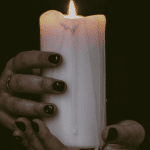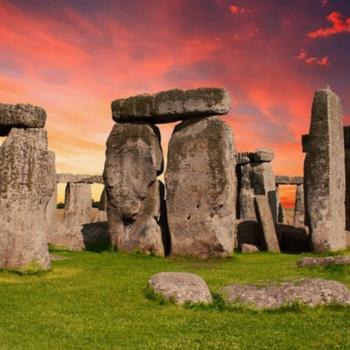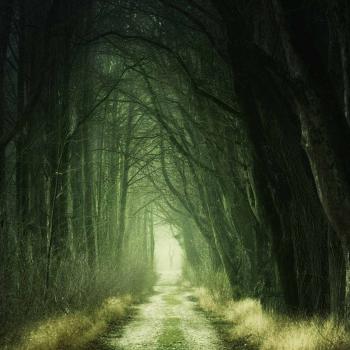If you aren’t listening to and making room for the voices of the women in your lives, if you’re ignoring our boundaries, gaslighting us, talking over us, ignoring our contributions, or taking away our rights, then you are not honoring the divine feminine. Any form of honoring you think you’re doing is just lip service. You can’t honor the divine feminine without feminism.
The Simple Way Divine Archetypes are Harmful
This feels like a really big topic, with a lot of potential to be misunderstood.* It’s one I’ve been thinking about for a while now. I think about the books I read when I was younger on paganism and how the goddess was always defined by fertility. Goddesses create, and give birth. Goddesses are categorized as being either in a state of pre-motherhood, motherhood, or post-motherhood. There’s not a lot to relate to there. It’s one action, one facet of being and it’s limiting. There are individual goddess stories that have a lot within them that is relatable. But the divine feminine energy as an abstract, the “goddess” without a particular name and story, is defined in broad strokes. When these strokes come together they form a very tiny box. It’s ridiculous that this box is meant to contain truly diverse feminine energy.
Divine Feminine Archetypes and Epithets are a Launching Point
I think the abstraction of divine energy is harmful. Goddess archetypes are often one-dimensional. I love and walk with Hekate, and she has many epithets. Her epithets show significant depth, and individually they are helpful when I want to connect with a specific energy she carries. Go have a look at the many epithets of Hekate (courtesy of Mat Auryn) and you’ll see how multi-faceted she is. Obviously, there will always be aspects I can’t relate to due to the differences in our natures. But relationships grow from connection, acceptance, and respect. Connections can only occur when there is the ability to relate.
Imagine if I took just one of those epithets and said that that was all she is or could be. I would be reducing her and denying her and cutting myself off from the many gifts she brings to the table. This happens to women every day when we are objectified, when we don’t fit into the boxes men think we belong in.
Divine Feminine Energy and the Dehumanization of Women
It is a mistake to of divine energy as forgiving but not vengeful, peaceful but not angry. To see this energy as compassionate but not just, gentle but not powerful, creative but not destructive. It’s also a way to suppress these very real character traits in women.
I know that I am not the only woman who has expressed righteous anger reasonably and been tone-policed for it. I’m not the only woman who has had the expectation of unconditional kindness toward abusers placed on her, who has received a negative response for being direct, who has been condescended to by a man. It’s true I’m not the only woman who has been told her intuition is B.S. and her emotions are too much, who has been pressured to think like a man, including accepting the male gaze that sees her only as an object and denies the importance of her personhood and her own pleasure. And I know I’m not the only woman who has experienced the expectation of being both chaste and sexual, or who has been told to hide her body.
I know that I am not the only woman who has had her boundaries crossed. I am not the only woman to speak up for herself and not only be ignored, but totally disregarded. Nor am I the only woman who has worked hard and had credit for it stolen by a man. I know I’m not the only woman to suffer abuse. And I am not the only woman who carried anger in her body for years. The list goes on.
Policing of Women’s Bodies
And let us not forget that it is an insult to be a “crone” (post-motherhood). As a culture we idolize women’s youth. We see this play out in a variety of ways. Women are conditioned to fear aging and to groom themselves according to cultural ideals. Women are disregarded if they don’t conform. There is a degree of invisibility no matter the age of a woman that gets worse as a she ages, and there is also a terrible degree of scrutiny no matter how old she is that results in a constant critique of her every move. Sometimes women who don’t acknowledge their internalized misogyny contribute to this.
What Honoring the Divine Feminine Looks Like
Honoring the divine feminine challenges this structure. It obliterates the tiny box of maiden, mother, crone. It calls in the diversity of destroyer, challenger, guardian, protector, guide (and more). Honoring the divine feminine means respecting women, standing for us, trusting us. It means making space for us, following our example, allowing us to lead, accepting us as we are without devaluing us, only objectifying us with our consent. It means respecting our autonomy and ability to choose when and where we create. As above, so below, as within, so without. How you relate to the divine feminine will necessarily translate in how you relate to women.
As a respected scholar Evelyn Nam once said, “women translate their righteous anger [at the violence inflicted on us by men] into fighting for social justice, equal rights, and restoration of human dignity for all human beings.” That fight is what feminism is, which includes the healing of men (who are also very much harmed by this system). Participating in this fight on whatever level you can is what it means to truly honor the divine feminine.
Disclaimer
*this was written from my perspective as a woman and for simplification addressed in gendered terms of men and women. However, what I wrote is easily applicable to misogyny vs LGBTQIA as well, and extrapolated and applied to white supremacy vs. all minorities. Both racism and sexism are systemic problems that hurt people on many levels. For a really simple breakdown on this system of violences and oppression, click here.
*I know I did not touch on the fact that feminine energy exists in every single person in this post nor that it is not specifically gendered in the traditional sense.
About the Author
Jessica Jascha is a Clinical Herbalist, Intuitive Consultant and writer in Minnesota. She also writes for Witch Way Magazine. She owns Jascha Botanicals and Owl in the Oak Tarot where she gives readings, teaches ritual, and provides holistic consultations. You can find her on Facebook.
featured image via Pixabay













